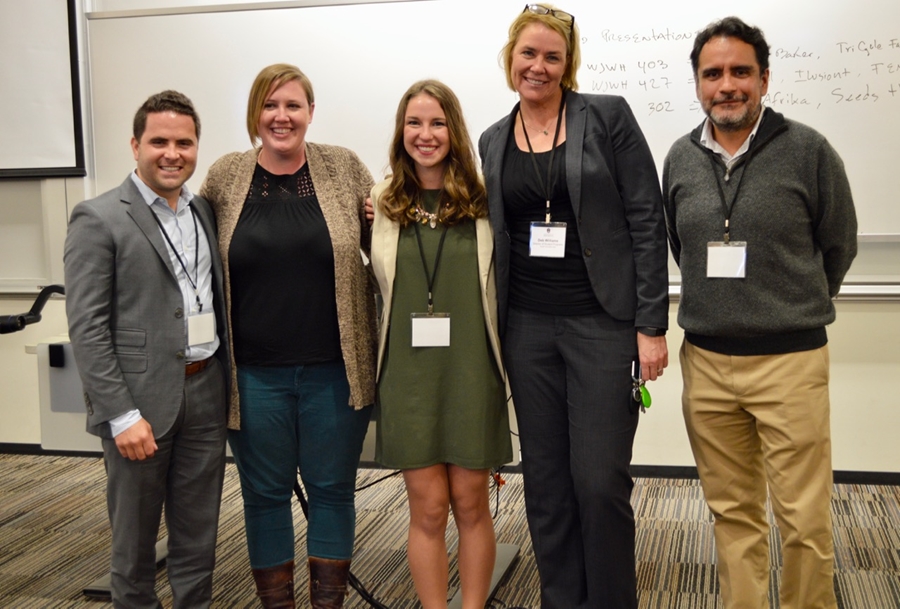A panel of faculty and expert judges selected sophomore Laura Wasson, a dietetics and human nutrition major, as the winner in the first-ever Design Solution Challenge, a semester-long social entrepreneurship competition sponsored by the Social Innovation Hub and the Office of Entrepreneurship and Innovation. Wasson will receive funding to attend and present her work at the conference of her choice.
Nine student teams presented in the competition's capstone event, the Changemaker Forum, last Saturday on the University of Arkansas campus. Each team presented a business-based solution to a specific challenge identified by one of several partner organizations — many of them nonprofits tackling pressing social or environmental problems in Northwest Arkansas.
Wasson, who undertook the challenge solo as part of an honor's thesis project, addressed a need identified by Fayetteville-based hunger relief organization Seeds That Feed. Seeds That Feed collects surplus fresh produce from area farmers and distributes it directly to hunger relief outlets in low-income areas, improving food access and reducing waste. The organization's core challenge is maintaining financial solvency while continuing to improve the efficiency of their operations. Wasson, whose research interests are related to the health benefits of micronutrients, proposed a survey to assess the impact of produce donations on the food recipient's micronutrient levels and overall well-being. By collecting quantitative data about the outcomes of their work, Wasson believes Seeds That Feed will be better equipped to make informed operational decisions and better able to communicate the value of their model to donors, partners and clients. She also proposed collecting personal stories from food recipients to balance the data with a human narrative.
"When I heard about the Hub, I thought it would be a great networking opportunity, but I had no idea it would result in this," Wasson said. "The Hub has given me an incredible organization to work with that I would not have met otherwise. At the end of the day, my work will give back to an incredible organization and to food-insecure families in Northwest Arkansas."
"Laura's approach to the challenge posed by Seeds That Feed exemplifies the value of social entrepreneurship," said Rogelio Garcia Contreras, director of social innovation for the Office of Entrepreneurship and Innovation. "By thinking quantitatively about outcomes and the financial value of collecting this kind of data, she is providing Seeds That Feed with a viable, sustainable model for improving their efficiency, and possibly also their bottom line."
Wasson was joined in the finalist round of presentations by two other teams: international business major Katrina Kinzel and social work major Jordan Blakemore, both sophomores, who proposed a strategic plan and marketing campaign for the nonprofit Compassion House; and freshman international business and Spanish major Evelin Potocnik, who developed an influencer marketing strategy for a nonprofit tourism agency called FEM in Cartagena, Colombia.
At its roots, social entrepreneurship is no different than traditional entrepreneurship, said Arkansas State Representative Warwick Sabin in his keynote presentation. "All entrepreneurship begins and ends with solving a problem," he said, adding that market-based solutions are lacking in corners of the nonprofit world that have grown dependent on continual philanthropic fundraising. Sabin observed that the business entrepreneurship that has driven great economic growth in Northwest Arkansas over recent decades could prove analogous for the social entrepreneurship movement that is improving food security, energy efficiency and healthcare across Arkansas today, most notably in the Mississippi Delta region.
In that spirit, Garcia Contreras conceived the Social Innovation Hub as a network of students, faculty, and outside partners who are interested in working across disciplines to solve problems like the ones posed by Seeds That Feed on an ongoing basis. The Hub's database will allow faculty and students to access specific challenges posted by organizations with a strong social or environmental mission. Students, faculty and partners interested in learning more can contact Garcia Contreras or OEI director of student programs Deb Williams for more information.
About the Social Innovation Hub: The Social Innovation Hub, an initiative of the Office of Entrepreneurship and Innovation and the Walton College of Business, is a multidisciplinary, virtual community where U of A students, faculty and staff have the opportunity to learn about pressing social and environmental problems. Students are invited to actively engage in developing solutions based on their own interests and skills.
About the University of Arkansas: The University of Arkansas provides an internationally competitive education for undergraduate and graduate students in more than 200 academic programs. The university contributes new knowledge, economic development, basic and applied research, and creative activity while also providing service to academic and professional disciplines. The Carnegie Foundation classifies the University of Arkansas among only 2 percent of universities in America that have the highest level of research activity. U.S. News & World Report ranks the University of Arkansas among its top American public research universities. Founded in 1871, the University of Arkansas comprises 10 colleges and schools and maintains a low student-to-faculty ratio that promotes personal attention and close mentoring.
Topics
Contacts
Sarah A. Goforth, director of outreach
Walton College of Business
479-225-7185,
